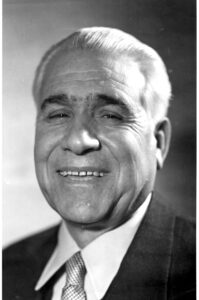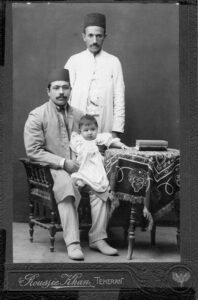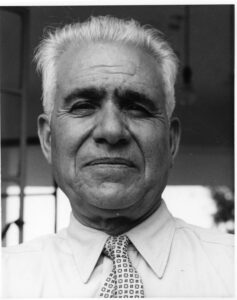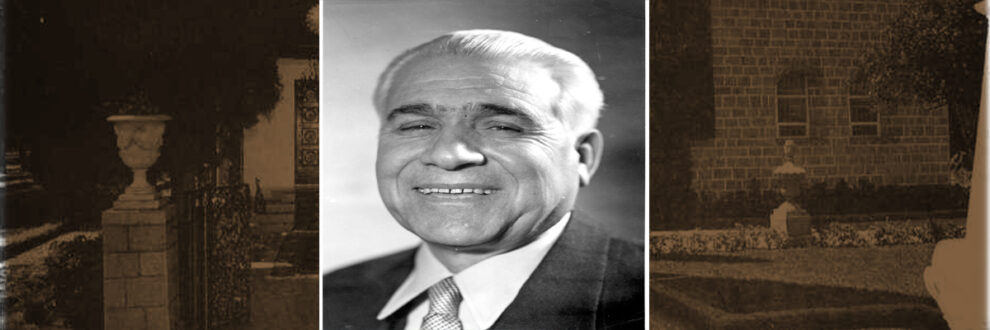 Valiyu’llah Varqa
Valiyu’llah Varqa
Born: 1884
Death: November 12, 1955
Place of Birth: Tabriz, Iran
Location of Death: Tubingen, Germany
Burial Location: Steinhaidenfriedhof Cemetery, Stuttgart, Germany
“Some time ago the Spiritual Assembly of the Bahá’ís of Tehran asked me to write my autobiography for them. In reply, I explained that during my youth I had had the privilege and honor to be in the blessed presence of His Holiness ‘Abdu’l-Bahá and to be one of His attendants during His visit to America. I had always seen and witnessed His utter self-abnegation in words and deeds. When I stop to ponder the resplendent services rendered by the early believers of the Faith and their heroic sacrifices, I do not see how I can give any account about myself.
“My father, ‘All Muhammad Varqa, a martyr of the Cause, was the third son of Haji Mulla Mihdi Yazdi, known as Atri, and my mother, Fatimih, was the daughter of Haji Mirza ‘Abdu’llah Khan Nuri of Mazindaran. These two grandparents were both staunch believers of the Cause, which they most earnestly served. I had three brothers. (My mother gave birth to four children.) The eldest was named Mirza ‘Aziz’uIlah Khan the second was named Ruhu’llah, who was martyred, the third was myself, and the fourth was called Badi’ullah, who died in childhood. As a family we all lived in Tabriz in the household of our maternal grandmother in perfect love and harmony and in complete ease and honor. “This happiness was, however, upset and shattered in consequence of some false reports submitted by certain enemies of the Cause to the Prince Regent, Muzaffari’d-Din Shah, to the effect that Mirza ‘Abdu’llah Khan, my  grandfather, who was then a member of his court, was acting against the Government and had put his house at the disposal of Bahá’ís gathering there to conduct anti-government activities. My grandfather was obliged, therefore, to escape to Tehran, and in his absence, my grandmother, who was a fanatical Muslim, found the opportunity to exert her enmity by opposing my father so strongly and relentlessly as to compel him to leave his home and native town, accompanied by his two eldest sons. My junior brother, Badi’ullah, and myself, being too small, were left behind with our mother in the same house where my grandmother lived. This did not, however, appease my grandmother. She had such a deep hatred of the Cause that she began to make evil suggestions to me against my father and to sow the seeds of hatred and enmity in my soul against him. She was able to impress my tender soul to such an extent that in my Islamic prayers, which I was obliged to say, I wept in bitter grief for my father’s deviation which had earned him so much hatred from the public.
grandfather, who was then a member of his court, was acting against the Government and had put his house at the disposal of Bahá’ís gathering there to conduct anti-government activities. My grandfather was obliged, therefore, to escape to Tehran, and in his absence, my grandmother, who was a fanatical Muslim, found the opportunity to exert her enmity by opposing my father so strongly and relentlessly as to compel him to leave his home and native town, accompanied by his two eldest sons. My junior brother, Badi’ullah, and myself, being too small, were left behind with our mother in the same house where my grandmother lived. This did not, however, appease my grandmother. She had such a deep hatred of the Cause that she began to make evil suggestions to me against my father and to sow the seeds of hatred and enmity in my soul against him. She was able to impress my tender soul to such an extent that in my Islamic prayers, which I was obliged to say, I wept in bitter grief for my father’s deviation which had earned him so much hatred from the public.
“Up to the age of sixteen, I lived with my grandmother in an atmosphere charged with such fanaticism and hatred towards the Cause. Then my uncle, Haji Mir Husayn, a sincere believer and teacher of the Cause, took steps to transfer me from Tabriz to Miyanduab, where I lived under his care and love for some years until I became a believer.”
“During my stay in Miyanduab, the late Siyyid Assadu’llah Qumi visited there and was a guest of my uncle. Feeling that I was extremely anxious to visit the Holy Shrines and the Center of the Covenant, he promised me, when leaving Miyanduab, that whenever he intended to leave for the Holy Land he would inform me that I might join him at Tabriz. Shortly afterwards I received his message telling me that he was ready to leave. Filled with great enthusiasm for this auspicious journey I did not even inform my uncle of my intended departure, since I thought he would definitely not allow me to make the journey because of his great affection for me. I forthwith left for Maraghih in company with one of the aged believers, and thence I proceeded to Tabriz. At Tabriz I was summoned by the Local Spiritual Assembly, who, after holding consultation regarding my aim, informed me that they had decided I should go to Tehran to stay with my brother Mirza ‘Azizu’lah Khan. To persuade them to revise their decision was out of the question… I took up my studies in the Tarbiyat School. At the same time I began to study English outside the school and took up a course in Arabic with Bahá’í scholars. I spend a few years also in the American High School in Tehran to advance my general education.
“The long-cherished time now came when with the consent of my dear brother I left for ‘Akka, where I had the great privilege of visiting ‘Abdu’l-Bahá, the Center of the Covenant. Following this auspicious occasion I proceeded to Beirut where I took up my studies with the aim of finishing the college course and continuing them in a university in England. During my stay in Beirut I was summoned by ‘Abdu’l-Bahá to ‘Akka every summer and there I had the opportunity to study the Cause and take teaching courses with other students under the late Haji Mirza Haydar-‘Ali.
 “In the summer of the year 1909, while I was in ‘Akka, I was instructed by ‘Abdu’l-Bahá to return to Tehran to fulfill a mission which He so kindly entrusted to me. In Tehran, after having carried out His mission, I married Bahiyyih Khanum, daughter of the late Sani-us-Sultan, surnamed Sani Illahi, of whom I had ten children. Seven of these children, three sons and four daughters, are now living and they are: ‘Ali Muhammad; Mihdi; Malihih (Mrs. Qubad); Munirih (Mrs. Farzar); Parvin (Mrs. Muvaflq); Malmud; Lami (Mrs. Nikanpar). I thank God that they are all Bahá’í and are firm in the Cause.
“In the summer of the year 1909, while I was in ‘Akka, I was instructed by ‘Abdu’l-Bahá to return to Tehran to fulfill a mission which He so kindly entrusted to me. In Tehran, after having carried out His mission, I married Bahiyyih Khanum, daughter of the late Sani-us-Sultan, surnamed Sani Illahi, of whom I had ten children. Seven of these children, three sons and four daughters, are now living and they are: ‘Ali Muhammad; Mihdi; Malihih (Mrs. Qubad); Munirih (Mrs. Farzar); Parvin (Mrs. Muvaflq); Malmud; Lami (Mrs. Nikanpar). I thank God that they are all Bahá’í and are firm in the Cause.
“I must express my great appreciation to my wife, who has sincerely collaborated with me since our marriage and who had, in fact, a greater share than myself in training the children in the Bahá’í spirit.
“After my marriage I took employment in the Russian Embassy as a secretary, but when ‘Abdu’l-Bahá was about to leave for America I left for ‘Akka with His permission and had the great honor of attending Him on His historic journey. After my return to Tehran, I was employed as First Secretary Translator by the Turkish Embassy. My daytime was spent working at the office and at night I was happy to serve on the Spiritual Assembly and on various Bahá’í committees. At both Embassies I had made it a condition with them not to require me to do anything concerned with politics. After many years of service, however, I was asked to do a service which slightly touched on politics, whereupon I tendered my resignation.
“For the last twelve years I have had the inestimable honor to serve as Trustee of Huququ’llah, having been appointed by the beloved Guardian, and it is my utmost wish that I may be able during these last days of my life to render befitting service to our Holy Cause and give satisfaction to our beloved Guardian.”
——end of autobiography——
The spiritual services of the Hand of the Cause Mr. Valiyu’llah Varqa, which began at the early age of twenty and ended with his death at the age of seventy-one, were characterized by ever-increasing zeal and enthusiasm throughout his life. His efforts in the Cause were redoubled particularly after the passing away of Mr. Amin Amin in 1938, when Mr. Varqa was entrusted by the beloved Guardian with the duty of taking care of the Huququ’llah. His elevation later to the rank of Hand of the Cause inspired in him a new spirit and stirred him to a still higher degree of service to the Cause of Baha’u’llah. In 1953 he prepared himself, under instructions from the Guardian, for participation in the Intercontinental Conferences.
He first attended the Kampala Conference and then the Conference in Chicago. During the interval between the latter and the Conference in Stockholm he was directed by the Guardian to proceed to South America, where he visited the area between Brazil and Santiago in Chile within forty-six days. His mission was to meet the friends and to give the Message to the people. On July 10, 1953, he left for Europe and, after participating in the Stockholm Conference, he visited a large number of cities in Germany by the order of the Guardian. In Hamburg, Frankfurt, Stuttgart, Munich and Esslingen he met many Bahá’í friends and others. In Stuttgart the preliminary signs of his illness began to appear. He stayed in a hospital for a week in Stuttgart and then for a further month in Ulm, where he underwent an operation.
Mr. Varqa’s request to Shoghi Effendi for a visit to Haifa had been granted for the time when the New Delhi Conference, in which Mr. Varqa was to participate, should have been concluded. He therefore left soon for New Delhi, not waiting to complete the convalescence period, and consequently had a very hard time during the days of the Conference. He then received the Guardian’s instructions to proceed to Iraq, Egypt and Syria on a teaching mission. He forthwith left New Delhi for Iraq. In that country his illness took a serious turn and he suffered extreme pain. He was therefore obliged to stay in the Haziratu’l-Quds in Baghdad. After a while, when he felt himself slightly better, he left for Cairo, Ismailia, Suez, Port Said, and Alexandria, where he visited the friends and gladdened their hearts by giving them an account of the magnificent results of the Conferences and of the rapid progress of the Cause in the world.
He then left for Turkey, where he visited the towns of Qazi Antap, Iskanderun, Adana and Istanbul, and met the friends. The unexpected cold weather in Turkey that year and Mr. Varqa’s ill health caused him a great deal of suffering.
He now reported to the beloved Guardian an account of his journeys and was then kindly instructed to return to Iran. After his arrival in Tehran, the Guardian appointed a time when he could visit the Holy Land. This visit to the Holy Shrines and to the beloved Guardian, which lasted about two weeks, inspired him with a new life and revitalized him for still further activities. He was then instructed by Shoghi Effendi to proceed to Germany so as to join the Hands of the Cause and at the same time to complete the course of his medical treatment. From there, on the Guardian’s instructions, he departed for Austria and stayed in Vienna for some time, where he started teaching the Cause and giving public addresses to large crowds of searchers for truth. He then returned to Iran.
In March 1955 he felt very severe pain which made him extremely uneasy. He therefore left for Europe again for medical treatment, visiting first Paris and then Italy. While receiving treatment he did not forget his teaching mission whenever he found an opportunity. He then proceeded to Germany and went to a hospital in Tubingen where for forty-one days he passed the last part of his brilliant life. Even during these last days he did not neglect his teaching duty. Whenever he felt a mitigation of pain and suffering he called to his bedside both friends and seekers of truth and spoke to them of the Teachings. But the light of his life was steadily fading, and it was on Saturday, November 12, 1955, that he passed away and joined the concourse on high. He was a drop that fell in the Great Ocean, a beam of light that attained to the luminous Sun.
After Mr. Varqa’s death the beloved Guardian ordered that a memorial be erected at his own expense, at the grave of Mr. Varqa in Stuttgart. The design was made by Mr. Seyhoun, architectural engineer, and while this account is being written the construction of the roof is nearing completion, under the supervision of Mr. Bauer, a beloved German friend. After it is completed the monument will bear evidence of the grace of God to His devoted servants.
After the passing of Jinabi Varqa the following letter was received in Germany:
Haifa, Israel
December 3, 1955
To the Bahá’ís who were gathered at the funeral of the Hand of the Cause, Valiyu’llah Varqa, in Stuttgart, November 17, 1955:
Dear Bahá’í Friends:
Your message touched our beloved Guardian very much, and he was happy to see that so many of the believers, both eastern and western, had been able to gather for his funeral, and honor this greatly-loved and staunch pillar of the Faith.
We are assured that, after so much suffering during the last years of his life, he has gone to receive a great reward in the Abha Kingdom.
The Bahá’ís could not have a better example before them of nobility and faithfulness than this distinguished Hand of the Cause; and it si a blessing for the German friends that their country should have
received his dust. The Guardian urges you all to follow in the footsteps of this beloved Hand, and to redouble your efforts to achieve the goals of the World Crusade apportioned to the German believers. He assures you all of his prayers for your success.
With Bahá’í greetings,
R. RABBANI
Assuring you of my deep and abiding appreciation of the sympathy you have expressed for the great loss sustained by our beloved Faith, and of my fervent prayers for the success of every effort you exert for its promotion.
Your true brother,
SHOGHI
Source:
The Bahá’í World 1954-1963. Kidlington, Oxford: George Ronald Publisher. Pp 531 – 534
Images:
Baha’i World Centre Archives





Add Comment